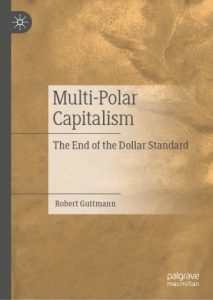 History teaches us important lessons, provided we can discern its patterns. Multi-Polar Capitalism applies this insight to the crucial, yet often underappreciated issue of international monetary relations. When international monetary systems get first put into place successfully, such as the “classic” gold standard in 1879, Bretton Woods in 1945, or the dollar standard in 1982, they structure relations between the system’s centre and the rest of the world so that others can catch up to the leader. But this growth-promoting constellation, a vector for accelerating globalization, runs its course eventually amidst mounting overproduction conditions in key sectors and spreading financial instability. Such periods of global crisis, from the Great Depression of the 1930s to stagflation in the 1970s and creeping deflation during much of the 2010s, force restructuring and policy reforms until conditions are ripe for a renewed phase of sustained expansion…
History teaches us important lessons, provided we can discern its patterns. Multi-Polar Capitalism applies this insight to the crucial, yet often underappreciated issue of international monetary relations. When international monetary systems get first put into place successfully, such as the “classic” gold standard in 1879, Bretton Woods in 1945, or the dollar standard in 1982, they structure relations between the system’s centre and the rest of the world so that others can catch up to the leader. But this growth-promoting constellation, a vector for accelerating globalization, runs its course eventually amidst mounting overproduction conditions in key sectors and spreading financial instability. Such periods of global crisis, from the Great Depression of the 1930s to stagflation in the 1970s and creeping deflation during much of the 2010s, force restructuring and policy reforms until conditions are ripe for a renewed phase of sustained expansion…
Robert Guttmann is Professor of Economics at Hofstra University, USA, and he is also affiliated with the Centre d’Économie Paris Nord (CEPN) of the Université Paris XIII in France. He studied in Vienna and at the University of Wisconsin-Madison, USA, before obtaining his PhD at the University of Greenwich, UK. He won “Distinguished Teacher of the Year” awards at Hofstra in 1989, 2004, and 2012. Professor Guttmann teaches international economics, monetary economics, financial regulation, and economic integration in the European Union. An expert in money and banking, international finance, and monetary theory, he has published numerous books and journal articles, including his best-selling books How Credit-Money Shapes the Economy (1994), Cybercash (2003), Finance-Led Capitalism (2016) and Eco-Capitalism (2018).